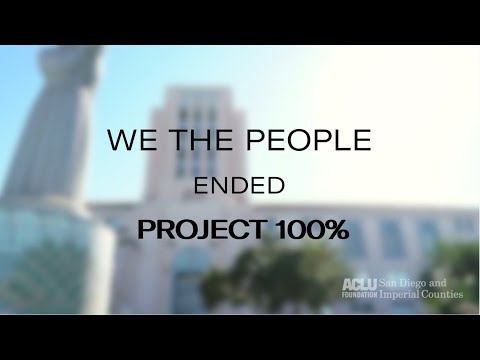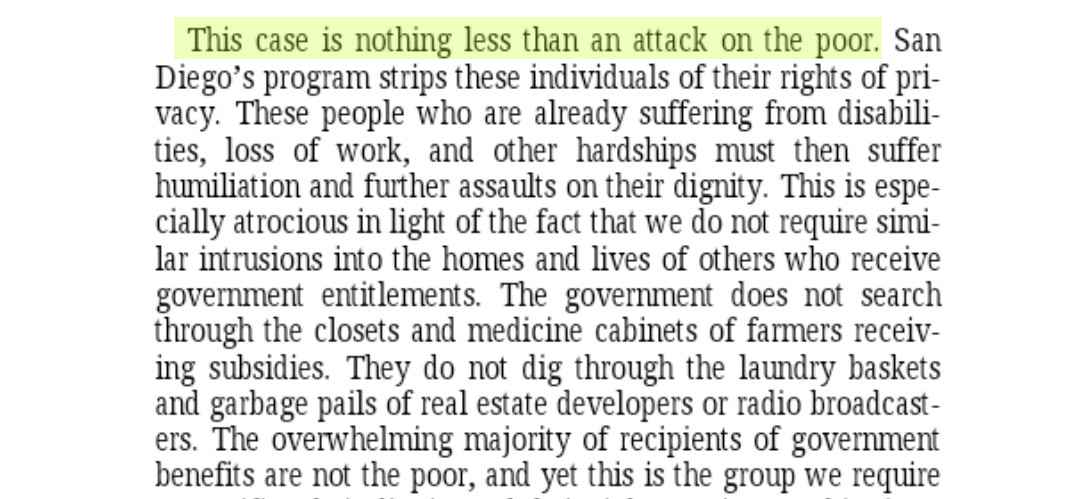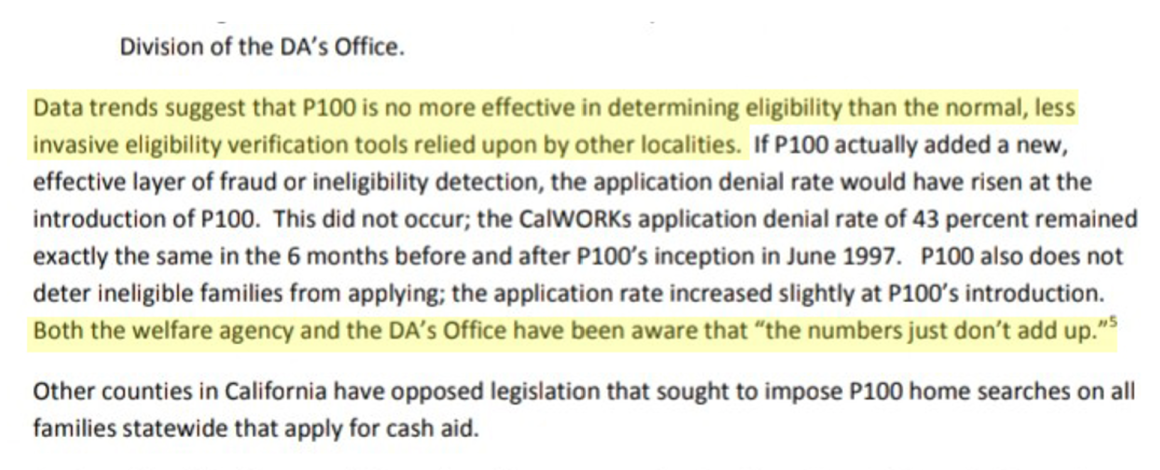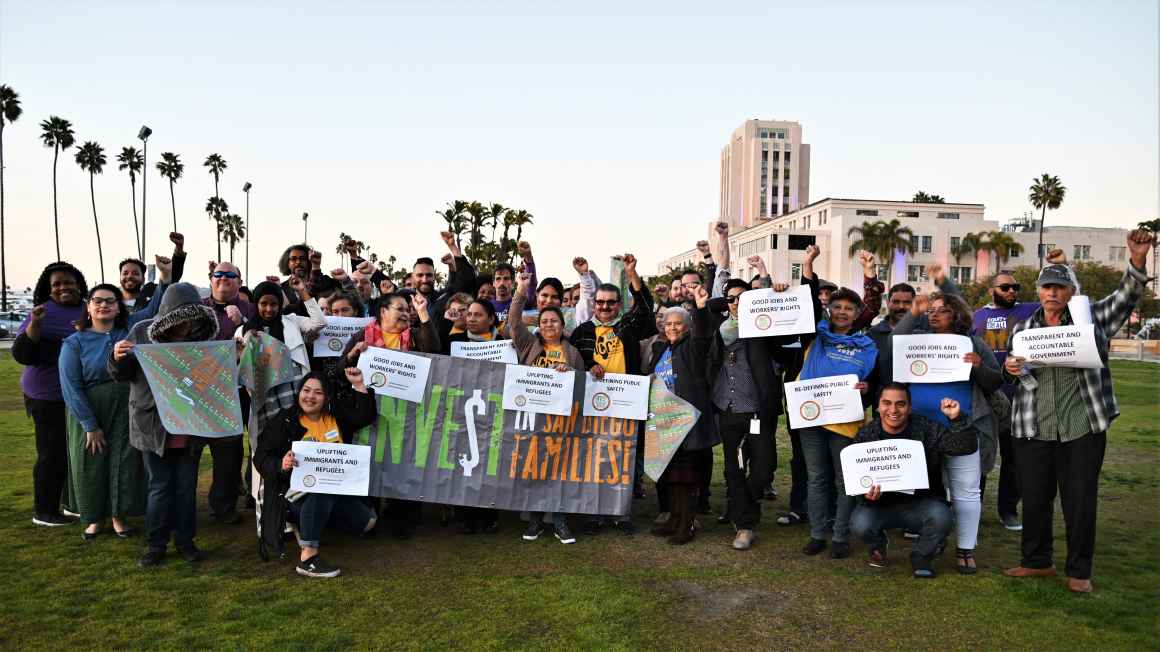Ending San Diego County’s Decades-Long, Shameful ‘Attack on the Poor’


The decades-long effort by the ACLU Foundation of San Diego & Imperial Counties (ACLUF-SDIC), local organizations, law firms and countless advocates determined to end Project 100% (P100) paid off in April 2021 when the San Diego County Board of Supervisors unanimously voted to abolish the unfair, unjust and invasive program.
The program, which began in 1997, required all CalWORKs (California Work Opportunity and Responsibility to Kids) applicants to submit to unannounced home investigations. There was no basis for suspecting these applicants of wrongdoing, yet, as part of this process, law enforcement investigators often searched applicants’ homes.
CalWORKs applicants could be denied benefits if they weren’t home when investigators arrived or if investigators found “evidence” proving applicants had unreported sources of income. This “evidence” could be something as trivial as an extra toothbrush – in the investigator’s eyes, this might mean that a single female applicant was hiding the presence of a male wage earner.

The ACLUF-SDIC and others challenged P100 from almost the beginning. We filed our first lawsuit in 2000 and another in 2018, in a fight inside and outside the courtroom that spanned more than two decades.
While our legal efforts did not prevail, they helped expose the horrors of P100 and paved the way for its ultimate demise.
The fight to end P100 began as a classic example of movement lawyering, with lawyers following the lead of a social movement, attempting to meet the legal needs of the community as defined by community members.
The First Lawsuit - Sanchez v. County of San Diego
Our fight against P100 started when attorney Joni Halpern brought the program to our attention.
Halpern was the director of Supportive Parents Information Network (SPIN). SPIN was a San Diego-based welfare rights organization that provided resources to families receiving public assistance. Halpern saw the distress P100 caused families, so she advocated for them and collected their stories.
In 2000, with SPIN members as our named plaintiffs, the ACLUF-SDIC and Western Center on Law & Poverty first challenged P100 in a federal class-action suit.
The suit, Sanchez v. County of San Diego, argued that P100 violated the Fourth and Fourteenth Amendments of the U.S. Constitution, along with various state statutes and regulations. After the district court ruled against the plaintiffs, a divided panel of the Ninth Circuit Court of Appeals affirmed the decision, based on a particularly cramped understanding of the Fourth Amendment.
Although the court’s decision was devastating, a scathing dissent recognized the policy violated “a welfare applicant's privacy expectation that the most intimate locations of the home will be free from the government's prying eyes.”[i]
The full Ninth Circuit declined to hear the case, but eight judges dissented. [ii]
Then, in November 2007, the U.S. Supreme Court declined to hear the case.[iii]
While the door was closed to federal challenges to P100, we continued to explore ways to fight it.
The Second Lawsuit - Villafana v. County of San Diego

In 2014, attorney Hilda Chan produced a revealing report on P100. Chan’s research proved the county had been inflating the efficacy of P100 for years, and prompted the county to begin re-coding its data.
When the county began releasing properly coded data, it became clear that P100 was ineffective at both detecting and deterring fraud.
Chan’s work and its outcome inspired ACLUF-SDIC’s Legal Director David Loy to think that P100 might be vulnerable to a new legal challenge.
In 2015, I came to the ACLUF-SDIC as a Skadden Legal Fellow to help David develop this new lawsuit against P100.
As part of my research, I met with CalWORKs applicants and recipients to confirm that P100 was still causing hardships. I spoke with people who’d found the searches humiliating or whose lives had been seriously disrupted while they were forced to remain in their homes waiting for investigators to arrive, sometimes for days on end.
I was inspired by college students who were CalWORKs recipients working in their campus CalWORKs office. These students were willing to help with the case — not because of the fear, trauma or residual anger they experienced during and after their home searches, but because they did not want others to suffer the same harms.
I spoke with Iraqi refugees who’d fled their home country and made the difficult, dangerous journey to the U.S. in hopes of finding safety and peace, and who told me of their pain when some of their first interactions with local government officials were with P100 investigators who made them feel like criminals in their new home.
In 2018, the ACLUF-SDIC joined forces with Fish & Richardson P.C. to challenge P100 in California state court in Villafana v. County of San Diego.
One of the law firm’s former partners, Craig Countryman, was devoted to providing legal services to people who couldn’t afford them. He brought a team of similarly dedicated lawyers to the case, including Aleksandr Gelberg, Madelyn McCormick and James Yang.
Countryman presented a moving and powerful oral argument in Superior Court when the county sought to dismiss the case. Unfortunately, Craig passed away in 2019 without seeing the supervisors’ decision to end P100.
In Villafana v. County of San Diego, we argued that P100 violated a California law, Government Code Section 11135, that prohibits state-funded programs from discriminating on the basis of race, sex, and other protected characteristics, whether by disparate treatment or disparate impact.
In our case, we argued that P100 created a form of disparate impact discrimination. Our argument stated that P100 imposed disproportionate hardships on women and people of color compared to the general population, for whose benefit safety net programs exist.
Unfortunately, the Court of Appeals rejected our claim because it took a narrow view of disparate impact law. The court held that there was no disparity because the people who suffered from P100 could only be compared to other people seeking CalWORKs benefits, who were also primarily women and people of color.[i] We asked the California Supreme Court to review the decision, arguing this was the wrong test, but it declined to hear the case.
Closing the Chapter on P100
We didn’t let the courts have the last word. We’d started this case by following the leads of community activists, and we were determined to continue the fight to meet community needs. The need to end an unjust, unfair program continued. So, we fought on.

Of course, the racism, xenophobia, and misogyny that animated P100 are all still with us, and there are many battles yet to be waged. But P100 is now what it always should have been – nothing more than a horrific relic of a bygone era. And our collective fight to end it is a testament to what is possible as we continue to fight for a more fair, just and equitable region.
Jonathan Markovitz is a staff attorney at the ACLU Foundation of San Diego & Imperial Counties and one of the lead attorneys in the Villafana v. County of San Diego lawsuit.
[Read Story: The 21-Year Fight to Bring Down Project 100%]
[i] Sanchez v. Cty. of San Diego, 464 F.3d 916, 941 (9th Cir. 2006) (Fisher, CJ, dissenting).
[ii] Sanchez v. Cty. of San Diego, 483 F.3d 965, 969 (9th Cir. 2007) (Pregerson, CJ, dissenting).
[iii] Sanchez v. San Diego Cty., Cal., 552 U.S. 1038 (2007).
[iv] Villafana v. Cty. of San Diego, 57 Cal. App. 5th 1012, 1020, (2020), review denied (Mar. 17, 2021).